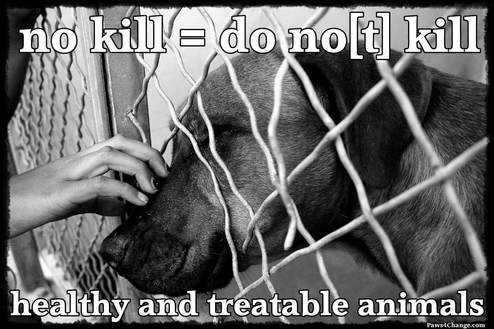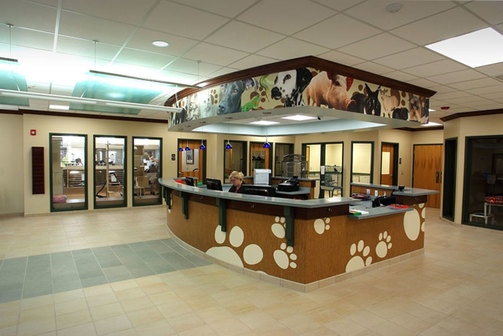|
A large animal welfare organization held its annual conference recently. One of the sessions in the conference was called “Language Matters.” I was not in attendance, but I have heard from contacts who were there that much of the session related to use of the phrase “No Kill” to describe an animal sheltering philosophy. I have written before about the phrase No Kill and about the word “euthanasia” as it applies to ending the lives of shelter animals in terms of what those words mean to me. Following the conference, I engaged in multiple communications with other people across the country in which the word “attack” was used to describe my behavior and that of other animal welfare advocates. Use of that word to describe my own advocacy and behavior is completely misplaced. I have never personally attacked anyone regarding my beliefs about animals and how they should be treated. I have been critical of the behavior of some people and plan to continue to do just that for the sake of animals who cannot speak for themselves. I once prepared an open records act letter seeking copies of shelter statistics and the letter was described as a personal attack. It was not. It was a request for public records, plain and simple. The fact that the recipient of the letter chose to take it personally, as opposed a request for records created in the course of running her city department, is something completely beyond my control. These communications did get me thinking about use of some of the key words we hear in animal welfare advocacy circles and how some words are used correctly (or incorrectly) to describe behavior. I am not a language expert. I do think that words are important. In theory, they should represent easily understood concepts and have somewhat universal meanings. I realize that is not always the case, of course. For what it’s worth, these are some of the key words and phrases I use in my own advocacy and what they mean (or do not mean) to me. Advocacy is a noun which describes the act of the act of pleading for, supporting, or recommending something. Animal welfare advocacy relates to actions taken or philosophies promoted which relate to animal welfare. Attack is a verb with many meanings. As a verb, it means to behave in a forceful, violent, hostile or aggressive way, to begin hostilities against or to blame or abuse violently or bitterly or to try to destroy. It is not an attack to recommend or suggest that municipalities use tax dollars and donations in ways which are consistent with public values. It is also not an attack to opine that animal welfare organizations which take in millions of dollars each year spend some of those funds in ways which actually benefit animals in our cities, counties and states in a "ground level" type of manner. Criticize is a verb which means to find fault with, to judge or to discuss the merits and faults of something or someone. It is entirely possible to criticize a person or organization while still either holding that person or organization in high regard or while still having many positive views about that person or organization. Constructive criticism is an adjective which means providing criticism to help improve, promote further development or promote further advancement. It is constructive because it is intended to creative positive results, as opposed to being destructive. Criticizing an organization or providing constructive criticism about an organization is not an attack. It is communication intended to convey information about how operations or systems can be improved, particularly as it relates to how public funds are used for municipal purposes. Euthanasia is the act or practice of killing or permitting the death of hopelessly sick or injured individuals (such as persons or domestic animals) in a relatively painless way for reasons of mercy. When healthy and treatable animals are destroyed in animal shelters, that is not euthanasia. It is killing them or destroying them. To use the word euthanasia to describe ending the life of a healthy and treatable animal should be offensive to anyone who has ever had a beloved pet euthanized to prevent suffering. The two acts have nothing at all in common. Kill is a verb which means to cause the death of a person, animal or other living thing. When the lives of healthy and treatable shelter pets are ended, they are killed. Having said that, I have never called the people who end those lives as killers or murderers. To do so is inflammatory and serves no real purpose in terms of seeking and end to that behavior. Municipal accountability is as a general principle which means that governments (including municipalities) are answerable to the public and responsible for their actions, decisions and policies. Every municipality is subject to both criticism and constructive criticism by the public it serves for the manner in which it governs and in which it makes use of public funds. No Kill is a phrase which refers to an animal sheltering philosophy in which healthy and treatable animals are not killed for space or convenience using our tax dollars or donations. It does not mean never kill. In the No Kill philosophy, animals who are suffering or who are irremediably ill are euthanized for reasons of mercy. Dogs who are genuinely dangerous and who pose a public safety risk (as opposed to dogs who are scared, traumatized or undersocialized) are also destroyed when no rehabilitation or sanctuary placement is available. Some say that use of the phrase No Kill is divisive or offensive. I find it no more divisive or offensive than the killing of healthy and treatable pets who either were or could have been someone's beloved pet. The phrase is on the public radar already. More and more people now know what it means. In the community where I work, people know that No Kill means that animals in our shelter are not at risk of being needlessly destroyed. This is a culture they want. There is nothing at all divisive about use of the phrase to describe a geographic safe haven for shelter animals. A puppy mill is a commercial farming operation in which purebred dogs are raised in large numbers. Smith v. Humane Society of the United States, 519 S.W. 3D 789, 801 (2017). I have been told by some that use of the phrase puppy mill is so offensive to some dog breeders that they equate it with a racial slur. I say that to take a description of a business operation and try to compare it to discriminatory words related to race is not only misplaced, but is surely offensive to those races which have been slandered through the use of slurs. A mill is an operation which has volume output, whether it is a paper mill, a textile mill, a cotton mill or a puppy mill.
Shelter is a noun used to describe something that covers or affords protection. Although the word shelter is often used to describe buildings in which animals are housed, many of those places are actually holding facilities or disposal facilities and do not deserve to be called shelters at all. A true shelter is a save haven for pets which 1) treats them as individuals whose lives all have meaning; and 2) which treats them either as someone's beloved pet or being capable of being someone's beloved pet.
0 Comments
Your comment will be posted after it is approved.
Leave a Reply. |
AuthorI am an animal welfare advocate. My goal is to help people understand some basic issues related to companion animals in America. Awareness leads to education leads to action leads to change. Archives
July 2024
Categories
All
image courtesy of Terrah Johnson
|




 RSS Feed
RSS Feed